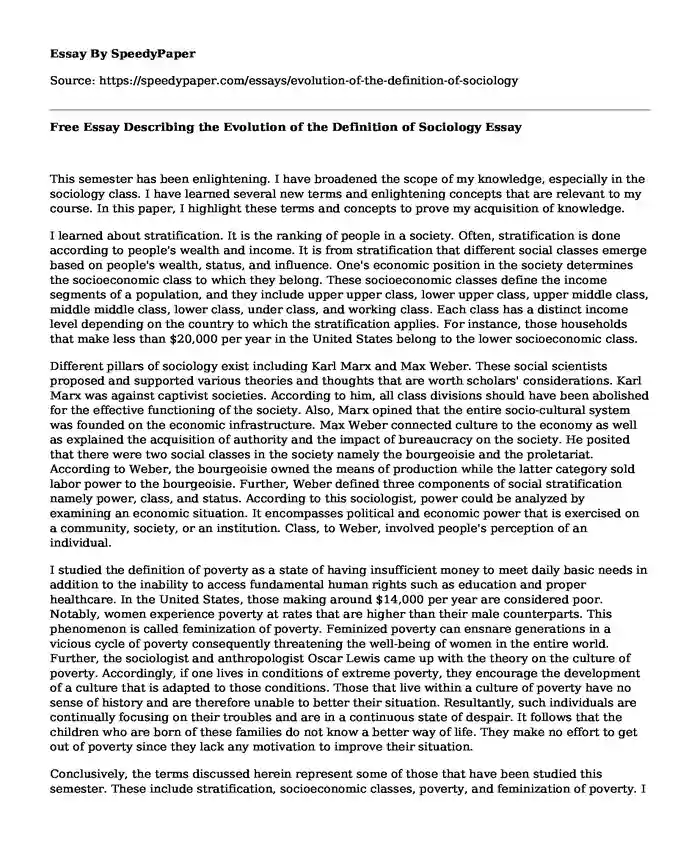
| Essay type: | Definition essays |
| Categories: | Learning Sociology |
| Pages: | 3 |
| Wordcount: | 604 words |
This semester has been enlightening. I have broadened the scope of my knowledge, especially in the sociology class. I have learned several new terms and enlightening concepts that are relevant to my course. In this paper, I highlight these terms and concepts to prove my acquisition of knowledge.
I learned about stratification. It is the ranking of people in a society. Often, stratification is done according to people's wealth and income. It is from stratification that different social classes emerge based on people's wealth, status, and influence. One's economic position in the society determines the socioeconomic class to which they belong. These socioeconomic classes define the income segments of a population, and they include upper upper class, lower upper class, upper middle class, middle middle class, lower class, under class, and working class. Each class has a distinct income level depending on the country to which the stratification applies. For instance, those households that make less than $20,000 per year in the United States belong to the lower socioeconomic class.
Different pillars of sociology exist including Karl Marx and Max Weber. These social scientists proposed and supported various theories and thoughts that are worth scholars' considerations. Karl Marx was against captivist societies. According to him, all class divisions should have been abolished for the effective functioning of the society. Also, Marx opined that the entire socio-cultural system was founded on the economic infrastructure. Max Weber connected culture to the economy as well as explained the acquisition of authority and the impact of bureaucracy on the society. He posited that there were two social classes in the society namely the bourgeoisie and the proletariat. According to Weber, the bourgeoisie owned the means of production while the latter category sold labor power to the bourgeoisie. Further, Weber defined three components of social stratification namely power, class, and status. According to this sociologist, power could be analyzed by examining an economic situation. It encompasses political and economic power that is exercised on a community, society, or an institution. Class, to Weber, involved people's perception of an individual.
I studied the definition of poverty as a state of having insufficient money to meet daily basic needs in addition to the inability to access fundamental human rights such as education and proper healthcare. In the United States, those making around $14,000 per year are considered poor. Notably, women experience poverty at rates that are higher than their male counterparts. This phenomenon is called feminization of poverty. Feminized poverty can ensnare generations in a vicious cycle of poverty consequently threatening the well-being of women in the entire world. Further, the sociologist and anthropologist Oscar Lewis came up with the theory on the culture of poverty. Accordingly, if one lives in conditions of extreme poverty, they encourage the development of a culture that is adapted to those conditions. Those that live within a culture of poverty have no sense of history and are therefore unable to better their situation. Resultantly, such individuals are continually focusing on their troubles and are in a continuous state of despair. It follows that the children who are born of these families do not know a better way of life. They make no effort to get out of poverty since they lack any motivation to improve their situation.
Conclusively, the terms discussed herein represent some of those that have been studied this semester. These include stratification, socioeconomic classes, poverty, and feminization of poverty. I also learned about the contributions from sociologists such as Karl Marx and Max Weber. Marx decried captivist societies while Weber proposed three components of stratification. All these terms have broadened my knowledge in sociology.
Cite this page
Free Essay Describing the Evolution of the Definition of Sociology. (2022, Aug 23). Retrieved from https://speedypaper.net/essays/evolution-of-the-definition-of-sociology
Request Removal
If you are the original author of this essay and no longer wish to have it published on the SpeedyPaper website, please click below to request its removal:
- Essay Example on Presentation Skills on YouTube
- A Literary Essay Example on The Bean Trees
- Paper Example: SWOT and PEST Analysis - Wedding Sector in Korea
- Literary Analysis Essay Sample: The Themes in "Gravel" by Alice Munro
- Admission Essay Sample: Management of Information System and Digital Innovation
- Paper Example. Critique Of A Health Care Website
- Essay Sample on Analysis of Social Problem: Drug Abuse
Popular categories




